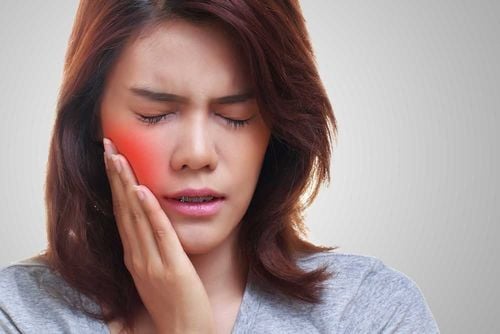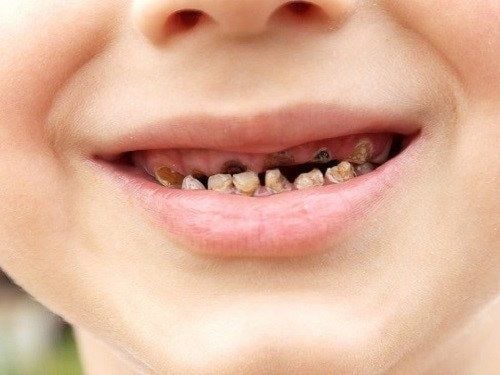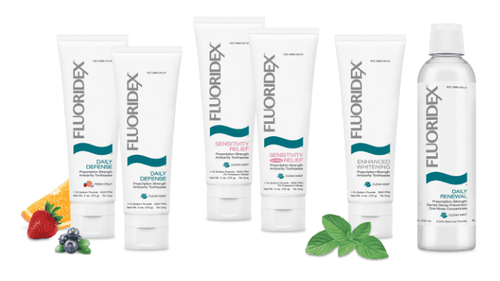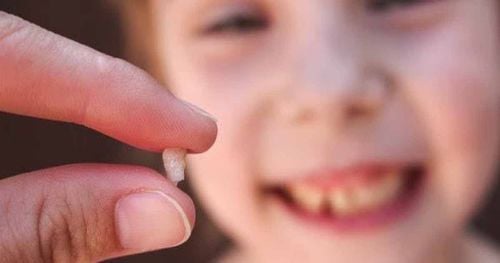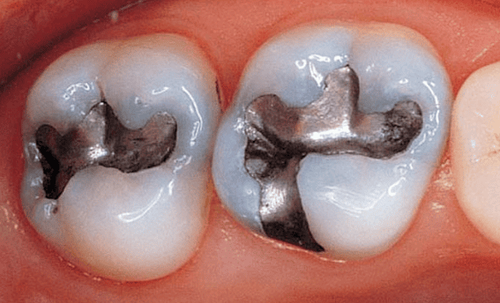This is an automatically translated article.
Tooth decay that is not treated in time will progress very quickly, causing complications such as pulpitis, gum swelling, tooth abscess... Accompanied by pain, sensitivity, affecting the Daily life. So what should tooth decay eat, what to abstain from?
1. Causes of tooth decay
Experts have pointed out 3 main causes of tooth decay including: sugar, bacteria and sugar time, bacteria clinging to the tooth surface. In it, bacteria exist in the layer of dental plaque. Sugar comes from food and drink. Bacteria live on teeth for 20 minutes to 1 hour after eating. Bacteria ferment sugar, produce acid and erode tooth enamel, causing tooth decay.
On the other hand, tooth decay can result from being eaten away by acids in the oral environment. Some studies also show that people who regularly drink fruit juices, carbonated soft drinks, and fermented foods have an increased risk of tooth decay.
Therefore, it can be affirmed that tooth decay comes from improper oral care and improper diet.
2. What is reasonable to eat tooth decay?
To prevent as well as avoid further progression of tooth decay, the patient should have a reasonable diet, as follows:
Eat soft foods, easy to chew and swallow, and put less pressure on the area of the tooth that is suffering. damage. Eat a variety of foods to ensure adequate nutrition for the body. In particular, eat a lot of protein foods such as fish, eggs, meat and fats. In particular, eating fat has the effect of coating a thin layer of fat on the surface of the teeth, so that food does not stick to the teeth much. Drink milk and dairy products like cottage cheese and cottage cheese. Although in Vietnam, eating cheese is not really popular, but it has been recognized as one of the foods that are good for teeth. When eating cheese, the calcium in it will be released, sticking to the surface of the teeth, like a barrier that protects the teeth from acid almost immediately. Eat starchy foods such as rice, bread, potatoes... Epidemiological studies have proven that starchy foods are less likely to cause tooth decay. People who follow a high-carb, low-sugar diet are also less likely to have tooth decay than those who eat a high-sugar, low-carb diet. Eat plenty of vegetables to make sure your body has enough fiber. According to the Institute of Medicine, an average adult needs about 15g of fiber per day. Women need a minimum of 25g of fiber while men need more, about 38g of fiber in a day. Should eat cabbage, broccoli, cauliflower, zucchini, pumpkin, carrot, tomato, lettuce... and seasonal vegetables. Pay attention to eat slowly, chew well before swallowing. Eat fruits rich in vitamin C and calcium for strong teeth such as: oranges, tangerines, kiwis, pears, guava, cucumbers... However, do not eat too much of this fruit because they have a lot of acid. To avoid tooth decay, each person should eat less than 500g of sugar/month. Alternative sweeteners or xylitol can significantly reduce the risk of dental disease. In the future, children's medicine will also use sweeteners instead of sugar.
3. What to abstain from tooth decay so that the disease does not get worse?
Besides the question "What do caries eat?", "What do tooth decay eat?" It is also what causes many patients headaches. According to experts - dentists - dentists - face items, people who are suffering from tooth decay should avoid consuming the following foods:
Foods such as cookies, sweets, jams, dried fruits, dried fruit, canned sauces... contain more sugar than people think. When they eat, they easily get stuck between their teeth, sugar combined with the environment in the oral cavity also makes tooth decay worse. Spicy and hot foods will stimulate toothache and tooth sensitivity. Foods that are easy to stick to teeth such as: sticky rice, sticky rice, gum, coconut candy... Avoid hard, chewy, flexible foods... need to use a lot of force to chew. Limit the use of stimulants such as: alcohol, beer, tobacco, ... when having tooth decay Carbonated drinks, including drinks labeled "low sugar", "no calories" or "only for people" dieters". In addition, drinking these types of water for a long time also causes yellow teeth and dry mouth. Hot coffee. Many people have the habit of sipping a cup of hot coffee in the morning to stay awake for work. However, they do not know that hot coffee will stimulate the nerves in the teeth, making the patient more painful. The caffeine in coffee is also easy to damage tooth enamel due to its high acidity. Cold water, ice cream. Not only does hot food affect tooth decay, cold food makes teeth more sensitive and easier to hurt. On the other hand, ice cream contains a lot of sugar, especially not suitable for people who are suffering from tooth decay. Chicken. No matter how it's cooked, the fibrous texture of chicken makes it easy to get stuck between your teeth. If the chicken is stuck in the painful tooth and is not cleaned in time, the person with tooth decay will feel uncomfortable and more painful. On the other hand, this also attracts bacteria in the oral cavity, causing bad breath.
4. How to take care of your teeth when you have tooth decay?
Besides paying attention to the foods that should be eaten and should be avoided when suffering from tooth decay, patients need to pay special attention to how to take care of their teeth. Here are some tips:
Brush your teeth 2-3 times in a day. You should brush your teeth gently, avoid being too strong, losing the protective enamel layer of your teeth. Choose a brush with a reasonable size, soft bristles, brush your teeth in turn, clean each part, not skipping the tongue. Rinse mouth with filtered water immediately after eating sweets, acidic foods. If you want to brush your teeth, wait 30 minutes to 1 hour so as not to damage the enamel. Use dental floss or water flosser to clean between teeth, remove food leftovers after eating. Use mouthwash after brushing and flossing. Mouthwash has many types for each age, do not let children share mouthwash with adults. Do not arbitrarily take pain relievers when suffering from tooth decay, patients need to visit a specialist for a detailed examination and advice when experiencing prolonged pain.
5. How to treat tooth decay?
Depending on the severity of the disease, mild or severe caries, the doctor will appoint one of the following treatment methods:
Filling cavities: When the decay is small and has not yet affected the pulp, the doctor conducts a filling. teeth to completely prevent the progression of caries. The treatment process is quick, does not need to grind teeth, is non-invasive, so the patient will not feel pain. Porcelain crowns: In more severe cases, for example, pulpitis, the doctor will assign porcelain crowns to the patient. Porcelain veneers ensure aesthetics, problems such as yellowed teeth, chipped teeth or broken teeth are no longer a concern. Tooth extraction: If the disease has become severe, the wound is deep, deeply rooted in the pulp, causing prolonged pain, the patient needs to have that tooth extracted. Dental bonding and porcelain crowns are no longer appropriate measures in this situation. Under the hands of experienced specialists and the help of modern medical equipment, the decayed tooth will be extracted and replaced with a new denture.
Please dial HOTLINE for more information or register for an appointment HERE. Download MyVinmec app to make appointments faster and to manage your bookings easily.




